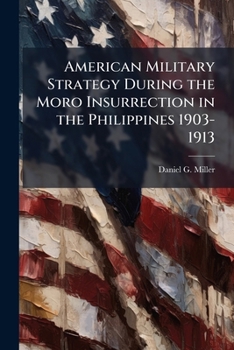American Military Strategy During the Moro Insurrection in the Philippines 1903-1913
This thesis explores the strategy followed by the American military government in overcoming Moro resistance in the Philippines from 1903-1913. A chapter is devoted to the period of each of the three Military Governors of Moro Province, Generals Leonard Wood, Tasker Bliss and John Pershing. The military governors primarily focused on first establishing a system of governance, followed by economic development and educational initiatives as a means of pacifying and controlling the Moros. Military operations were only intended to play a supporting role in the American strategy to pacify the Moros. However, security threats and violent opposition constantly hindered that strategy so that pacification and acquiescence to American rule could not be established. Ultimately, it was Pershing's decision to focus on security through his disarmament policy and the subsequent campaigns to enforce that policy that finally established conditions for the transition of governance to civilian control and end military government within the province. Though initially conceived of as a supporting effort to a broader whole of government approach, in the end military operations became the decisive means for ending Moro resistance to American authority.
This work has been selected by scholars as being culturally important, and is part of the knowledge base of civilization as we know it. This work was reproduced from the original artifact, and remains as true to the original work as possible. Therefore, you will see the original copyright references, library stamps (as most of these works have been housed in our most important libraries around the world), and other notations in the work.
This work is in the public domain in the United States of America, and possibly other nations. Within the United States, you may freely copy and distribute this work, as no entity (individual or corporate) has a copyright on the body of the work.
As a reproduction of a historical artifact, this work may contain missing or blurred pages, poor pictures, errant marks, etc. Scholars believe, and we concur, that this work is important enough to be preserved, reproduced, and made generally available to the public. We appreciate your support of the preservation process, and thank you for being an important part of keeping this knowledge alive and relevant.
Related Subjects
Education Education & Reference History Political Science Politics & Social Sciences




